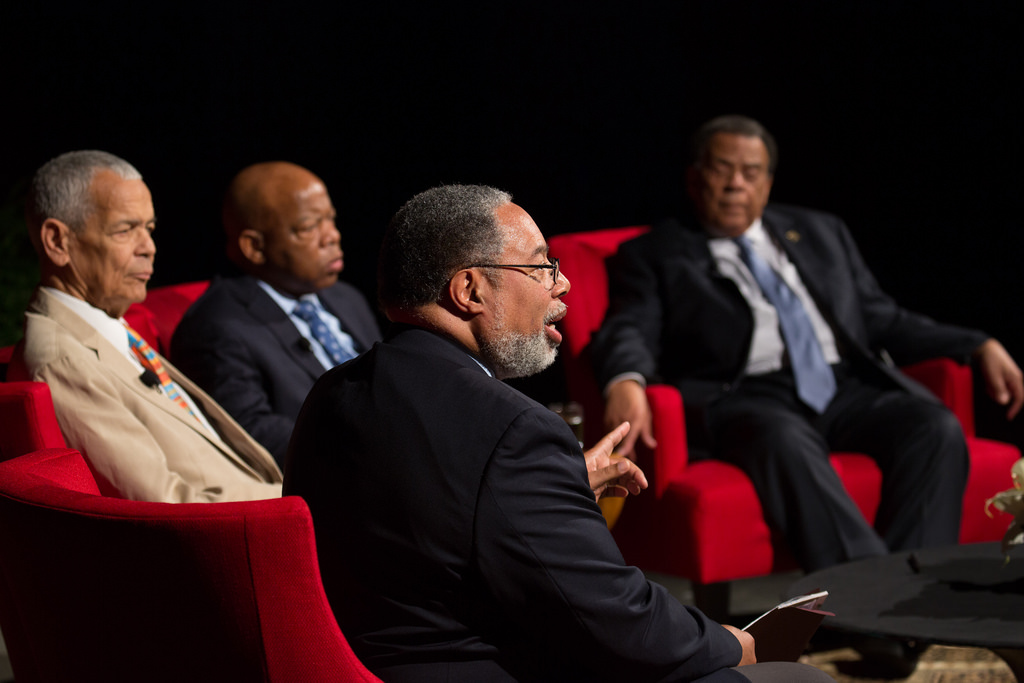April 8-10, 2014 marked some of the best and most important days in my time as a student at the LBJ School. I am extremely proud that our school had a significant role in the creation and implementation of the Civil Rights Summit, marking the 50th anniversary of the passage of the Civil Rights Act. Several times over the past few weeks I have found myself thinking about the stroke of luck I had in being a student during this time.
The Summit brought together some of the greatest minds and most courageous people in our nations history. I was lucky enough to either attend or live stream every Summit event. I am excited that most students at LBJ were able to attend at least one event. I am also pleased that Kerri Battles and Kelly Pratlett of the Dean’s Office worked hard to ensure student involvement, and that several faculty members were supportive of student watch parties and discussions (special thanks to Professor Angela Evans and Professor Shirley Franklin for moderating, and to Dr. Pat Wong and Dr. James Galbraith for attending).
Though I found the Summit to be empowering and inspiring, I think it is important to point out that the Summit lacked several types of diversity. The Civil Rights Movement demands inclusion of all communities because diversity is a crucial component in the civil rights conversation. Any event, but in particular an event celebrating this movement, must include all communities. Additionally, I believe that when an event is as important as the Civil Rights Summit, we all have a responsibility to make it the best it can be. It is our responsibility to point out the ways in which the Summit could have been improved in hopes that the LBJ Library and the administration at the LBJ School will make inclusion a priority in recruiting and selecting future speakers.
There were only nine women and one Latino at the Summit who had the opportunity to speak. And there was a panel discussion on gay marriage without any person who identifies as LGBT on the panel. I thought that the caliber of almost every single panelist and moderator was wonderful. But the panels were insufficient without the addition of women, Latinos, and LGBT persons.
Let me speak to the issue of women’s representation in particular. The women represented at the Summit were Patty Griffin (introducer), Mavis Staples (panelist and performer), surprise guest Doris Kearns Goodwin (panelist), Luci Baines Johnson (introducer), Bernice A. King (introducer), Lynda Johnson Robb (introducer), Shirley Franklin (moderator), Maria Schriver (panelist), and Margaret Spellings (panelist). A panel on women’s issues was planned, which would have included three additional women in the Summit, but was cancelled at the last minute due to an illness and death in the family (while the cancellation is understandable, there were enough amazing women at the Summit that the panel could easily have gone on as scheduled with new panelists).
Out of the 57 speaking or performing roles at the Summit, women had only 12 of these roles (some women spoke or performed more than once). That means that women made up only 21 percent of those at the Summit whose ideas were heard. In reality, women have been and continue to be an important force within the Civil Rights Movement. Women, and members of the Latino and LGBT communities, deserve to be heard. It is my hope that in the future members of every community are included in these important discussions about civil rights.
My favorite panel of the Summit, entitled “Heroes of the Civil Rights Movement: Views from the Front Line” featured some of my heroes: Julian Bond, John Lewis, and Andrew Young. These panelists, though all men, spoke to the diversity of the movement, acknowledging the important role women and other minority groups played. And their advice was spectacular. When speaking about his role as a leader of both social change and policy making, Ambassador Young told the audience that you either have to run, fight, or negotiate, and he learned to do all three at the opportune times.
I am taking Ambassador Young’s advice to heart. Today, I choose to fight for inclusion and ask the LBJ Library and the administration of the LBJ School to consider inclusion of all communities as they recruit and select speakers for future events. I am proud to attend an excellent graduate school next to a monumental presidential library. But both institutions could be more spectacular if diversity and inclusion were at the forefront of more decision making.

